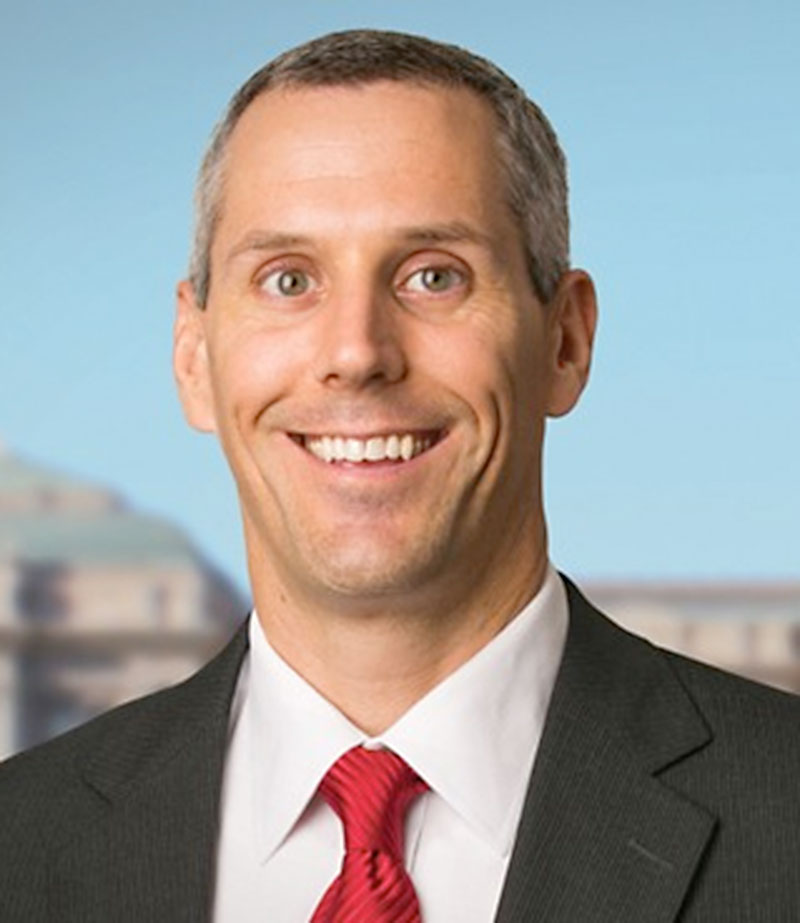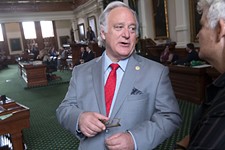85th Texas Legislature Preview
Can the GOP-run House and Senate get along well enough to get anything accomplished?
By the News Staff, Fri., Jan. 13, 2017
If any moment captured the underlying conflict leading into the 85th Texas Legislature, it came on the afternoon of Thursday, Jan. 5. In his dual role as lieutenant governor and president of the Senate, Dan Patrick had prepared a bombastic press conference promoting what he sees as a most pressing public issue: Senate Bill 6, "the bathroom bill." As that was happening, House Speaker Joe Straus released a statement detailing the findings of the Texas House Select Committee on Mental Health, and committing the House to a reform of the state's approach to mental health. Hyper-conservative dogma pushing partisan legislation on one side, a pragmatic approach to policy built upon bipartisanship on the other. The irony is that, for decades, the Senate was the mature chamber; the House, the erratic side of the Dome. Now, Patrick's hardline Senate has veered ever deeper into the fundamentalist quagmire, while Straus' House stands as the place bad legislation goes to die.
The 85th Legislature is a conundrum. For the last few years, Republican leadership has walked in with big and clear agendas – budget slashing, gerrymandering, voter suppression, abortion bans – that defined where conflicts would arise. This year, points of friction seem less obvious. Patrick's Senate will undoubtedly deliver extremist legislation, but there are real doubts that the House will have interest in picking any up, when there are far more pressing and immediate issues. Will representatives really care about Senate schemes for school vouchers when their local ISDs are screaming for more funding? Do they really want to waste time on a contentious and broadly opposed bathroom bill when the state's highways are literally crumbling?
Of course, the House is as Republican-dominated as the Senate – both roughly two-thirds GOP majority – and Texas remains a conservative stronghold. The question now is, who gets to define what conservative really is? – Richard Whittaker
Budget: Spread Too Thin?
For the past decade, the Republican-run Legislature has cut the fat, the meat, and is now gouging into bone. And they're expecting counties and cities to do the same. Lt. Gov. Dan Patrick has set the anti-spending tone. In November, he issued his legislative priorities: light on details, but promising "a balanced budget that will strengthen the Texas economy and assure that it retains its global competitiveness." House Appropriations Committee Member Donna Howard, D-Austin, called that "a redundant statement," reminding Patrick indirectly: "We're required by the [Texas] Constitution to do that."
Prior to January, lawmakers faced two unknowns. The revenue estimate was not due until Jan. 9, meaning they didn't know how much they'd have to spend. It was pretty clear any budget figure would be reduced from the $209.4 billion legislators allocated when they built the current framework in 2015. When Comptroller Glenn Hegar's numbers arrived on Monday, they were bleak, with general revenue forecasts down 2.7% from last biennium, to $104.9 billion. That reduction has two causes. While the state economy continues growing, gas and oil tax revenue has dropped as prices plummeted. Lawmakers also passed $4 billion in tax cuts last session. Howard says those cuts dug a permanent hole just when lawmakers recognized that hydrocarbon tax revenues would drop.
The second unknown hinges on the federal government. Trump and a Republican Congress have both made threatening moves toward Medicare and Medicaid, which could blow holes in budget calculations. Statewide, the GOP solution is simple: Cut spending even more. Last year, Patrick, Speaker Joe Straus, and Gov. Greg Abbott told agencies to cut draft budgets in their 2018-19 Legislative Appropriations Request by 4%. Yet there are legislative priorities that make such a thing impossible. The state won the school finance lawsuit, but there was a consensus last session that the current funding system needs a change. Similarly, we've seen recently that the foster care system needs substantially more caseworkers – hiring those people will cost the state real money.
Some of that cash exists. Ann Beeson, executive director for the Center for Public Policy Priorities, said, "We do have a very healthy Rainy Day Fund, and it is there precisely to help in times when we're not that flush." Beeson expects the House to be more receptive to increased investment; smaller districts mean state reps are more in tune with constituent needs. She sees a path toward targeted spending if advocates argue for the opportunity cost. See the national, bipartisan pushes for criminal justice reform and mental health provision as examples; conservatives can argue that early intervention is cheaper than reactionary enforcement.
For many Texans, the state budget seems vast and remote. More pressing are the ever-increasing property tax bills. While much of their increase comes from the state refusing to pay for public schools, Patrick's allies are instead targeting the cities and counties. The state already pulled back at almost every level on paying for local services, and forced local entities to pick up the bill. Now legislators want to block those local entities from covering such costs. Currently, if a city raises the property tax rate by more than eight cents per $100 of valuation, voters can petition to force a rollback election. Under Senate Bill 2, authored by Sen. Paul Bettencourt, R-Houston, any raise over four cents would automatically trigger a vote. Both the Texas Municipal League and the Texas Association of Counties have issued warnings that SB 2 could cripple the state's ability to pay for essential services like roads and public safety, while providing little to no meaningful tax relief to residents. Beeson echoed that complaint: "Not only does it not make sense, but it doesn't make fiscal sense, because it costs a lot of money to run those elections." She suggested that city managers will find workarounds to fill in those missing dollars, "and it will just cause more bureaucracy and pain." – R.W.
Drugs: Feigning Compassion
The Texas Compassionate Use Act (SB 339), signed by Gov. Greg Abbott in 2015, was originally heralded as a life-changing step for people suffering from severe medical conditions like epilepsy. In fact, legislators had crafted a law that made it hard for patients to obtain the marijuana-derived CBD oil, a non-psychoactive drug containing low amounts of THC. Requiring physicians to prescribe the oil would break federal law – risking their licenses with the Drug Enforcement Administration – and licensing and registration of dispensaries got left to the discretion of the Department of Public Safety, which in December proposed raising application fees from $6,000 to $1.3 million, making it nearly impossible to enter the business. DPS was required to have at least three dispensaries operating by Sept. 1. Eight months from that deadline, Texans have yet to see one open.
Texas lags in marijuana policy, but many are hopeful this legislative session will put an end to such conservatism. Sen. José Menéndez, D-San Antonio, introduced SB 269 to end the uselessness of SB 339. It would completely legalize medical cannabis, which would in turn allow licensed organizations to grow and sell marijuana products to benefit anyone approved by a doctor and issued a medical marijuana card. Sen. José Rodríguez, D-El Paso, submitted two similar proposals, Senate Joint Resolution 18 to legalize cannabis for medical use, and SJR 17 to give Texans an opportunity to vote for marijuana legalization in the Nov. 2018 election.
As for illegal use, Rep. James White (R-Woodville) favors a first chance intervention program. His HB 58 would allow a specialty court for first-time offenders. Rodriguez's SB 170 would treat nonviolent drug crimes – possession of one ounce of weed or less – with a fine rather than criminal offense. The senator argues it would save state and local governments millions in diversions. Sen. Joe Moody, D-El Paso, continues to push for decriminalization; his similar bill, HB 81, would reduce possession of one ounce or less from a $2,000 fine and 180 days in jail to a $250 fine. Rep. Harold Dutton, D-Houston, isn't far behind with HB 82, which would change possession of an ounce or less from a class B misdemeanor to class C.
Conservatives are still working their own agendas. Making already strict welfare laws even stricter is on the list again this session. Sen. Jane Nelson has proposed SB 268, which would require applicants to pass drug screenings and testing to qualify for benefits through the Temporary Assistance for Needy Families program. Rep. Ken King, R-Canadian, filed companion bill HB 436 to set longer restrictions on TANF applicants who don't pass drug screenings. – Montinique Monroe
Transportation: Lege Rules, OK?
Since Texas voters endorsed Prop. 7 in Nov. 2015 – directing additional sales taxes and other funding to TxDOT highway projects – there is less urgency about broad transportation plans in the 2017 session. However, that leaves more opportunity for legislative meddling in local matters – and the likeliest target will be city regulations governing "transportation network companies" like Uber and Lyft.
Notably, that could mean that all the Austin aggravation over ride-hailing, and the subsequent May public vote to confirm Council-enacted regulations, may be rendered moot. Bills filed by Sen. Charles Schwertner, R-Georgetown, and Sen. Robert Nichols, R-Jacksonville (who chairs the Senate Transportation Committee), differ in details, but neither would require fingerprint background checks – currently mandatory in Austin and Houston – and either would remove any regulatory power from municipalities.
Sen. Konni Burton has followed the anti-municipal trend: Her SB 385 would forbid accepting federal funds for passenger rail projects without a public vote – moreover, a metropolitan planning organization would be forbidden even to include a federally funded passenger rail project in its planning without a public referendum. As Burton would have it, the Legislature won't pay for mass transit – and it won't allow anyone else to pick up the bill. – Michael King
Women's Health: The War Wages On
Every other January it's hard to imagine how much more damage the Lege can inflict on women's reproductive health care – until the bills start trickling in. On the first day of pre-filing, conservative lawmakers managed to file three anti-choice bills. Several more have crept in since. The most egregious is HB 87 from Rep. Matt Schaefer, R-Tyler, which would remove the current exception that allows women with severe, irreversible fetal abnormalities to obtain abortion at 20 weeks of pregnancy, a redux of his 2015 (eventually halted) amendment. Thanks to the remaining parts of HB 2, abortion is illegal at 20 weeks – but don't exclude the possibility of legislators attempting to prohibit the procedure before then, as seen with Ohio's now vetoed six-week abortion ban bill.
Blake Rocap, legislative counsel at NARAL Pro-Choice Texas, says the discredited Planned Parenthood "sting" videos anti-choice groups released last year will lead lawmakers to aggressively limit fetal tissue donation. "There's going to be an effort to restrict abortion in the name of reacting to those falsified videos," he said. That's the case so far: The "Pre-Born Protection and Dignity Act," (SB 8) by Sen. Charles Schwertner, R-Georgetown, restricts human fetal donation to only certain facilities and bans those facilities from donating tissue from an abortion. (That bill also bans so-called partial-birth abortion, a redundancy. It's already banned in the U.S.) HB 201 by Rep. Byron Cook, R-Corsicana, is the bill version of a rule (now tied up by a legal challenge from abortion advocates) that forces women to bury or cremate the fetal tissue from an abortion or miscarriage.
All the focus on fetal remains isn't enough for powerful anti-choice lobby Texas Right to Life. John Seago, TRL legislative director, tells the Chronicle his group will prioritize "fetal dismemberment bans," which, as evidenced by other states that have attempted such laws, targets the surgical abortion procedure dilation and evacuation, or D&E. "Bills over fetal tissue donation fundamentally miss the point," says Seago. "We are not pro-life because we primarily care about what you do after an abortion … We need bills that actually stop elective abortion." Sen. Charles Perry, R-Lubbock, and Rep. Stephanie Klick, R-Ft. Worth, granted TRL's wishes early this month with SB 415 and HB 844. TRL also backs SB 20 by Sen. Larry Taylor, R-Friendswood, which would deny abortion coverage under health insurance plans.
Meanwhile, Democratic lawmakers are proposing ways to protect women's health and safety. Rep. Donna Howard has authored a handful of bills that include removing sales tax (the "tampon tax") from the purchase of sanitary products (HB 219); expanding birth control coverage under the Children's Health Insurance Plan (HB 222); increasing penalties for the assault of employees at abortion clinics (HB 261); and ensuring physicians don't need to dispense medically inaccurate information to patients (HB 262), even if it's state-mandated as in the pre-abortion "Woman's Right to Know" booklet. Many Dems, including Howard, are concerned about recovering from the damage done to the women's health and family planning system, a network tattered throughout the years as a result of political attacks. While some of the funds were restored in 2013, programs still have yet to see the same number of women served as before the state cut $74 million from the family planning budget in 2011. "I think we are going to continue to be distracted by ideologues talking about restricting access to safe, legal abortion," said Howard. The state's latest move to kick Planned Parenthood out of Medicaid enrollment ensures the restoration process will be even more onerous.
Any abortion-related bill that passes through the Legislature will now have to reconcile with the Supreme Court's Whole Woman's Health v. Hellerstedt decision, which mandates reproductive health laws serve as a public health benefit, and not just an ideological pretext. While TRL and NARAL sit on opposite ends of the fight, they seem to agree that conservative lawmakers aren't deterred by the high court ruling and have, if anything, gained confidence from the election of Donald Trump, who has vowed the repeal of Roe v. Wade and selected Rep. Tom Price, an anti-choice politician with a long history of blocking contraception access, to lead the Department of Health & Human Services. "Knowing an abortion bill might be unconstitutional has never slowed [legislators] down – it doesn't really enter into their calculus," says Rocap. "In fact, they probably feel like they need to fight harder because they had a loss at the Supreme Court." – Mary Tuma
Criminal Justice: New Lessons for Everybody
You'd be hard-pressed to find a more obvious example of the failures present in Texas' criminal justice system than the July 2015 in-custody death of Sandra Bland in Prairie View. Bland, whose failure to signal a lane change got her pulled over, never would have died had she not been arrested for a misdemeanor by an officer with an overzealous attitude toward use of force and booked into a county jail with failing standards for accountability and oversight. State Rep. James White, R-Woodville, and Sen. Konni Burton, R-Ft. Worth, have filed bills to combat that first issue: Both HB 567 and SB 271 would prohibit arrests for misdemeanor offenses punishable by fine only.
That's the headliner, but there are a number of CJ reforms hoping to get sent to committee hearings. White has two others of note: HB 562 would create better data-keeping systems for inmates with mental illnesses, and HB 553 would create a task force within the Department of Criminal Justice to look at academic credit and trade industry recognition for inmates engaged in certain work or activities while incarcerated. Elsewhere on education, HB 314 from state Rep. Jarvis Johnson, D-Houston, seeks to create an educational curriculum and academic standards for juveniles; outside of confinement, John Whitmire's (D-Houston) SB 273 would create a ninth-grade public school curriculum to teach kids how to talk to the police. (Lesson 1: Don't call that cop a pig.) Ana Hernandez's (D-Houston) HB 239 would produce a report from TDCJ on the conditions of pregnant inmates, including standards for gynecological care, prenatal health visits, and mental health care. HB 673, from Eric Johnson, D-Dallas, would increase data-keeping from our state's attorney general, requiring Ken Paxton's office to create a website displaying every report a local law enforcement agency sends to them.
Then there are two from Harold Dutton, D-Houston, that both pertain to death row: HB 147 would prohibit the death penalty for people convicted under Texas' law of parties (like Jeff Wood, who was only an accomplice to murder) and HB 64 would eradicate the death penalty altogether. Both bills would replace the death penalty with life without parole. – Chase Hoffberger
Guns: They're in the Constitution
The big bill is HB 375, filed by state Rep. Jonathan Stickland, R-Bedford, and better known as "constitutional carry." Such legislation would all but eradicate the permitting process for new gun owners, making both processes optional. The proposed bill is a direct descendant of Stickland's failed HB 195 last session. Already 11 states adhere to some form of constitutional carry. Another high-profile bill came into focus Jan. 1, after state Rep. Armando Martinez, D-Weslaco, was shot in the head shortly after midnight during a celebration of the new year. From his hospital bed, Martinez, a concealed handgun licensee, declared plans to file legislation that would reduce or altogether ban celebratory gunfire, though nothing's been filed to date. Elsewhere on the gun front, state Sen. Robert Nichols, R-Jacksonville, and Rep. Dustin Burrows, R-Lubbock, have both filed bills – SB 16 and HB 339 – that would eliminate the fees associated with obtaining a license to carry a firearm. (Certification costs about $140.) Rep. Rafael Anchia, D-Dallas, filed HB 259, which would make it an offense to sell firearms at gun shows without using the National Instant Criminal Background Check System, or without a record of sale. Sen. José Menéndez filed SB 222 to designate June as Gun Violence Awareness Month. (Fat chance.) And state Rep. Joe Moody, D-El Paso, has filed HB 111, which aims to reduce fees for any license needed for a secure gun storage device. – C.H.
Voter ID: Barriers to Entry
Texas' voter ID law sits in limbo since July, when the 5th Circuit Court of Appeals judged it unconstitutional. So while Republicans keep pushing for the U.S. Supreme Court to reinstate restrictions, Democrats have filed a slate of bills to blunt those edges. The cornerstone strategy remains ensuring that those legally eligible to vote face as few barriers as possible. Key to that may be SB 284 by Sen. Kirk Watson, D-Austin. It doesn't repeal the law, but instead extends the list of acceptable documents to include student ID cards, and any photo ID issued by a state agency. Next are the measures designed to get young voters to the ballot box. HB 209 by Rep. Terry Canales, D-Edinburg, requires high schools to carry voter registration forms, while SB 145, from Sen. Sylvia Garcia, D-Palito Blanco, establishes voter education programs for seniors. Meanwhile, Rep. Donna Howard, D-Austin, has filed HB 368, which will allow people who will be 18 at the next general election to vote in the preceding primaries. Of course, all the IDs in the world are meaningless unless you're actually registered, so Reps. Carol Alvarado, D-Houston, and Celia Israel, D-Austin, have both filed online electronic registration bills (HBs 80 and 143, respectively). Complementing this, Garcia's SB 143 will require fuller and specific explanations be provided when a registration is denied. – R.W.
Labor: An Alternative Vision
If there's a common theme developing in anticipation of the 85th Legislature, it's the determination of state legislators to make certain that "local control" is nothing more than campaign rhetoric, whether the subject is environmental protection, transportation planning and regulation, or workers' rights. Rick Levy, Texas AFL-CIO Secretary-Treasurer, says the "big overarching issue" for progressive organizations this year is "massive state interference in the affairs of local communities." Whether it's plastic bag bans, or ride-hailing regs, or worker protections, Levy said, some legislators are looking to obstruct "any attempt to address standards of living, improve environmental quality, block predatory lending, etc. … That's going to be a major fault line of the session."
"Obviously we're going to be playing significant defense," Levy said of labor advocates. "We're facing attacks on public employee pensions, on union dues checkoff … on whether workers should even have a voice in their workplace." He pointed specifically to SB 75, a bill filed by Sen. Jane Nelson, R-Flower Mound, that would forbid a union from accepting as members "minors" (under 18) without written parental permission. Other bills already filed would prevent public agencies from allowing automatic dues checkoff for employee union members (except police, fire, and EMS). Locally, Austin's sole GOP Rep., Paul Workman, has filed HB 577, which would prohibit "Fair Chance" hiring ordinances for former inmates, such as Austin's, enacted last year.
"It's part of an attack on workers and labor rights," Levy said, "but it's not just labor. It's one aspect of a broader assault on people's ability to control their own affairs. … It's equally important for progressives to stand for something – to present an alternative vision that people can believe in. We need to fight for a fair shot for working families: for living wages, for earned sick leave, for family medical leave, for equal pay for equal work. We need to fight for higher education, for job training, and oppose attacks on immigrants. And we need to hold folks at the Capitol accountable for their actions." – M.K.

Immigration: Slamming the Door Shut
Prior to the 2017 session, conservative leaders were already vowing to crack down on so-called "sanctuary cities," a vaguely defined term that refers to cities that resist federal immigration enforcement. Lt. Gov. Dan Patrick called the issue one of his top legislative priorities, and Gov. Greg Abbott has begun the attack on "sanctuary campuses," threatening to cut funding to Texas universities that harbor undocumented immigrants. Taking the torch from state officials, Sen. Charles Perry, R-Lubbock, filed SB 4, which would require local law enforcement to aid federal authorities in enforcing detainer requests and prohibit them from endorsing policies that discourage immigration enforcement – a similar measure from Perry failed in 2015. (Rep. Jeff Leach, R-Plano, filed the House companion, HB 611.) Conroe Rep. Will Metcalf's HB 52 requires law enforcement to verify a person's immigration status when they make a search or an arrest, opening the floodgates to racial profiling. And SB 108 from Sen. Bob Hall, R-Edgewood, would ensure undocumented immigrants receive harsher penalties in court.
Conservatives have also filed measures to roll back in-state tuition rates for DREAMers, undocumented students who came to the country as children, and require state contractors to use the E-Verify system to check the legal work status of employees. Advocates of fair, safe labor and immigration reform at the Workers Defense Project plan to mobilize this session with lobbying and testimony. "Anti-immigrant bills like SB 4 tie the hands of local law enforcement and undermine community trust," said Ana Gonzalez, a policy advocate with WDP. "Immigrant families have been under attack in this state and country for years. We are particularly watchful given the new administration and the increased fear we see in our community." – M.T.
Education: Who Needs It?
Last session, lawmakers punted on reforming the educational system, expecting that Texas' Supreme Court would force them to act this year. So when the court ruled that the current structure reached the bare minimum required by the constitution (See "If It's Broke, Don't Fix It," May 20, 2016), it seemed lawmakers might be off the hook. Turns out that with school property tax bills spiraling up, they may have no choice.
Local property taxes increase because the state decreased its share of public school funding to a current record low, 42%. To combat that, Rep. Donna Howard, D-Austin, has authored HJR 27, requiring the state to pay at least 50% of public education costs. It's a long shot, so changes are more likely found tweaking the existing system. Howard said there's "some bipartisan support" for adjusting the weighting (whereby districts get extra cash for extra unavoidable expenses) and putting additional money identified into the basic allotment. More likely to pass are measures cutting unnecessary costs. That includes SB 215 from Sen. José Menéndez, D-San Antonio, which proposes reducing the unnecessary expense of elementary and middle school over-testing.
However, Lt. Gov. Dan Patrick is not only likely to oppose any extra education funding, but has committed himself again to school vouchers. Senate Education Chairman Larry Taylor, R-Friendswood, is set to carry that legislation – poorly camouflaged as education savings accounts. The hyper-conservative Senate is also set to target the Texas version of the DREAM Act, giving qualified undocumented students access to in-state tuition rates. Ann Beeson, who runs the Center for Public Policy Priorities, described this as not just bad policy, but fiscally irresponsible, "because the more kids we have who get degrees and go into the workforce, the better for the Texas economy." – R.W.
LGBTQ: March of the Bathroom Bigots
The 85th Legislature presents a tug-of-war on LGBTQ rights. Lt. Gov. Dan Patrick's retitled bathroom bill, "The Texas Privacy Act," is already receiving national attention for being as transphobic as it is sexist. Filed by Sen. Lois Kolkhorst, R-Brenham, SB 6 specifically targets transwomen and girls from using the restroom of their choice by arguing that "men" don't belong in "women's" restrooms. If passed it will trump local nondiscrimination ordinances and put in place serious penalties for schools and public buildings who do not enforce the Act.
HBs 192 (by Rep. Diego Bernal, D-San Antonio) and 225 (Rep. Eric Johnson, D-Dallas) seek to prohibit discrimination in housing and employment. The companion SB 165 (co-authored by Senators José Rodríguez, D-El Paso; Sylvia Garcia, D-Houston; Juan Hinojosa, D-McAllen; and John Whitmire, D-Houston) attempts to put a single law in place to prohibit LGBTQ discrimination encompassing housing, employment, public accommodations, and state contracting. Conversely, several bills push the conservative agenda to legalize discrimination. Rep. Phil King, R-Weatherford, filed HB 428 to make religious student organizations at public universities and colleges a safe space for bigots by allowing them exemption from schools' nondiscrimination policies. Proposed SB 89 from Bob Hall, R-Canton, aims to "protect" the Texas Constitution by letting state politicians refuse to enforce federal law if they find it violates the state's constitution. Hall's SB 92 would eradicate local ordinances providing nondiscrimination protections, such as Austin's.
Austin Rep. Celia Israel's HB 569 would penalize mental health care providers attempting any form of gay conversion therapy. Conversely, SB 242 by Konni Burton, R-Ft. Worth, entitles parents to all school records concerning their child, which could force schools to out LGBTQ youth against their wishes.
Several symbolic bills have been filed, including HB 494, which, if passed, would prohibit Texans from traveling to states with enacted discrimination laws, like North Carolina. SBs 166, 236, and 251 seek to remove the "unconstitutional provision on 'homosexual conduct'" from state penal codes – on the books despite being ruled unconstitutional in 2003. And SBs 157, 236, and 251 would amend the status of same-sex marriage in the Texas Family Code to reflect the Supreme Court's 2015 ruling. – Sarah Marloff
Environment: The Return of Gridzilla?
Longtime Sierra Club lobbyist Ken Kramer says he doesn't anticipate major water legislation. "Legislators are still waiting to see more results of the 2013 State Water Implementation Fund (SWIFT). It's on track, although fewer rural projects have come through than expected." The 2015 session saw the defeat of "Gridzilla" – a proposal to establish a statewide water grid to move large amounts of water around the state – and Kramer believes the odds of passage remain slim. "It's got an enormous price tag, and it's opposed by environmentalists, landowners, and fiscal conservatives." He does expect some bills "to tweak the regional water planning process and groundwater management, as well as bills to advance water conservation."
Public Citizen's Tom "Smitty" Smith echoed widespread concerns about bills filed against "cities trying to protect themselves" on several fronts: single-use plastic bag bans, ride-hailing regs, restrictions on McMansions and short-term rentals, even protections for heritage trees and watersheds. "They've also targeted citizen participation altogether – making it more difficult to have contested case hearings [at the Texas Commission on Environmental Quality], limiting the rights to a fair hearing."
The Sierra Club's Cyrus Reed reiterated warnings on restrictions on citizen participation, but said there should also be significant support for new recycling programs, including battery take back/recycling programs as well as tire recycling – "that's become an industry issue because of the spread of mosquitoes and the Zika virus." He also expects action to extend the Texas Emissions Reduction Program beyond its scheduled 2019 termination.
The common worry at Lege time: One step forward for cities becomes two steps backward at the Capitol. – M.K.
Got something to say on the subject? Send a letter to the editor.
Read more of the Chronicle's decades of reproductive rights reporting here.
























